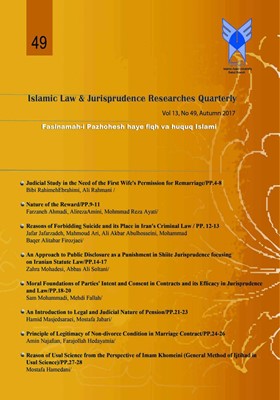Reasons of Forbidding Suicide and its Place in Iran's Criminal Law
Subject Areas : Private law
Jafar Jafarzadeh
1
*
![]() ,
Mahmoud Ari
2
,
Ali Akbar Abulhosseini
3
,
Mohammad Baqer Alitabar Firozjaei
4
,
Mahmoud Ari
2
,
Ali Akbar Abulhosseini
3
,
Mohammad Baqer Alitabar Firozjaei
4
1 - Yadegar Imam University
2 - Babol Branch, Islamic Azad University, Babol, Iran
3 - Assistant Professor in Islamic Law & Jurisprudence, Babol Branch, Babol, Iran
4 - Ph.D Candidate of International Relations, Gilan University, Gilan, Iran
Keywords: criminal law, Suicide, Suicide bomber, Self-injury,
Abstract :
Suicide is an act which is the subject of a crime and also can be the object of a crime (victim). In other words, if the victim of murder is innocent, he himself is a murderer. In fact, suicide is a kind of murder with the unity of the killer and the victim. From the Islam's viewpoint the suicide is forbidden. Its application in book, tradition and consensus is fixed. In Iran's criminal law, suicide does not relate to the offense. Of course, recently, according to the penal code of computer crime, some forms of computer systems which lead to suicide can be regarded as a crime and are punishable.
_||_
. Ali Ahmadi, H. (1965). Qavaed fiqh (2nd ed). Tehran: Tehran University.
2. Goldoziyan, E. (2005). Exclusive penalty rights. Tehran: Tehran University Press.
3. Gorji, A. (2003). Blood-money. Tehran: Tehran University Press.
4. Hur Ameli, M. (No date). Shiite means. Qom:Aal Bayt Institute.
5. Ibn Edris Helli, M. (No date). Al-Saraer. Qom: Islamic Publication Institute.
6. Mohaghegh Helli,A. (N.D). Sharayea Islam. Qom: Islamic Publication Institute.
7. Mohammadi, A. (2003). Principles of inference in Islamic law. Tehran: Tehran University.
8. Mohseni, M. (1997). Public prosecution period (Criminal responsibility). Tehran: Ganj Danesh Publication.
9. Najafi, M. (No date.). Javaherol Kalam fi Sharhe Sharaeol Islam. Beirut: Maktabat Basirati.
10. Nouri. H. (No date.). Mostadrak Alvasael. .Beirut: Maktabat Basirati.
11. Qomi, A. (1989). Safinatol Behar. Qom: Numismatics Institute.
12. Shambayati, H. (2003). General criminal law (2nd ed). Tehran: Majd Institute.
13. Tabarsi, A. (2011). Assembly of Al-Bayan Fi Tafsir Al-Quran. Mashhad: Astan Qods Razavi.
14. Tabatabaei, M. (1995). Almizan Fi Tafsir Al-Quran. Qom:Islamic Publication Institute.
15. Toobaie,M. (2005).Qavaed Figh. Tehran: Tehran University.
16. Tousi, M. (1982). Alkhelaf. Qom: Islamic Publication Institute.
17. Validi, M. (2001). Exclusive penalty rights. Tehran: Amir Kabir Publishing.

